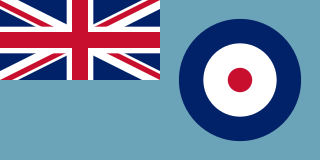
The Bristol Type 156 Beaufighter is a British multi-role aircraft developed during the Second World War by the Bristol Aeroplane Company. It was originally conceived as a heavy fighter variant of the Bristol Beaufort torpedo bomber. The Beaufighter proved to be an effective night fighter, which came into service with the Royal Air Force (RAF) during the Battle of Britain, its large size allowing it to carry heavy armament and early airborne interception radar without major performance penalties.

The Bristol Beaufort is a British twin-engined torpedo bomber designed by the Bristol Aeroplane Company, and developed from experience gained designing and building the earlier Blenheim light bomber. At least 1,180 Beauforts were built by Bristol and other British manufacturers.

Royal Air Force East Fortune, or more simply RAF East Fortune, is a former Royal Air Force station located just south of the village of East Fortune. It is a short distance east of Edinburgh, in Scotland. RAFEast Fortune was used as a fighter station during the First World War and later used by a night fighter operational training unit during the Second World War. The motto of the station is "Fortune Favours the Bold".
Royal Air Force Crosby-on-Eden, or more simply RAF Crosby-on-Eden, is a former Royal Air Force station located 5.8 miles (9.3 km) north east of Carlisle, Cumbria and 3 miles (4.8 km) west of Brampton, Cumbria. It is nowadays Carlisle Lake District Airport.

Royal Air Force Haverfordwest or more commonly RAF Haverfordwest, is a former Royal Air Force station located 2.1 miles (3.4 km) north of Haverfordwest, Pembrokeshire and 11 miles (18 km) south of Fishguard, Pembrokeshire, Wales.

Royal Air Force Talbenny, or more simply RAF Talbenny, is a former Royal Air Force station located 5.6 miles (9.0 km) north west of Milford Haven, Pembrokeshire and 7.9 miles (12.7 km) south west of Haverfordwest, Pembrokeshire, Wales.

Royal Naval Air Station Dale is a former Royal Naval Air Station, located 10 miles (16 km) South West of Haverfordwest in Pembrokeshire, Wales. It was operational between 1942 and 1948, being used by both the Royal Air Force (1942–1943) and the Royal Navy (1943–1948).
Royal Air Force Honeybourne, or more simply RAF Honeybourne, was a Royal Air Force station located 0.6 miles (0.97 km) south of Honeybourne, Worcestershire, England and 4.6 miles (7.4 km) east of Evesham, Worcestershire, England

No. 1 (Coastal) Operational Training Unit RAF, was a training unit of the Royal Air Force, within No. 17 Group RAF, which was part of RAF Coastal Command. The unit was established during April 1940 by the redesignating of an existing RAF Coastal Command unit, and disbanded during October 1943.

No. 2 (Coastal) Operational Training Unit RAF, was a training unit of the Royal Air Force, within No. 17 Group RAF, which was part of RAF Coastal Command. The unit started operating from late 1940 and disbanded during early 1944.

No. 3 (Coastal) Operational Training Unit RAF, was a training unit of the Royal Air Force, within No. 17 Group RAF, which was part of RAF Coastal Command. The unit started operating from late 1940 and disbanded at the start of 1944, being absorbed into No. 6 OTU.

No. 16 Group RAF was a group of the Royal Air Force. It existed over two periods in two different roles. No. 16 Group was initially a training group, from 1918 to 1920, that had been transferred from the Royal Flying Corps. It reformed as a reconnaissance group under RAF Coastal Command, in 1936.

No. 17 Group RAF was a group of the Royal Air Force which was operational in the last year of the First World War, and throughout the Second World War.

798 Naval Air Squadron was a Naval Air Squadron of the Royal Navy's Fleet Air Arm which disbanded in March 1946. It formed at RNAS Lee-on-Solent, in October 1943, to provide advanced conversion courses, it initially operated with various single and twin-engined aircraft. Twin-engined aircraft broke away to become 762 Naval Air Squadron during March 1944. It had a detachment at RNAS Stretton for operational training for new Fairey Barracuda squadrons, but returned to HMS Daedalus at the beginning of August. The unit’s role changed slightly during 1945, providing refresher training, including Fleet Air Arm ex-Prisoners of War at RNAS Halesworth. The squadron moved to RNAS Hinstock, although operated out of its satellite RNAS Peplow, during November 1945.

Flying Boat Training Squadron RAF is a former Squadron of the Royal Air Force which was operational between 1931 and 1956 through various names.

Coastal Command Anti U-Boat Devices School RAF was a training unit of the Royal Air Force and part of RAF Coastal Command. The unit was established during April 1945 by the redesignating of an existing RAF Coastal Command unit. The unit had several different identities beforehand. It began as the short lived No. 7 Operational Training Unit which only existed during 1940, before reforming in 1942 as No. 7 (Coastal) Operational Training Unit. It disbanded and was redesignated a few more times before becoming the Coastal Command Anti U-Boat Devices School.

No. 1 Torpedo Training Unit RAF, was a training unit of the Royal Air Force. It was later allocated to No. 17 Group RAF, which was part of RAF Coastal Command. The unit was established during February 1936 and initially disbanded during May 1944, reforming in August 1945 and finally disbanding in December 1947

No. 132 (Coastal) Operational Training Unit RAF, was a training unit of the Royal Air Force, within No. 17 Group RAF, part of RAF Coastal Command. The unit was established during November 1942 and disbanded during May 1946.

No. 5 (Coastal) Operational Training Unit RAF, was a training unit of the Royal Air Force, within No. 17 Group RAF, which was part of RAF Coastal Command. The unit was established during August 1941 and disbanded during August 1945.









